Just before the long-awaited release of Chapter 2!
Special talk: Director Nobuyoshi Habara and Writer Harutoshi Fukui
First published in the July 2017 issue of Bandai’s free promotional magazine V-Storage, this interview was later expanded in V-Storage Online. The expanded version is translated here. See the magazine here and the online post here.
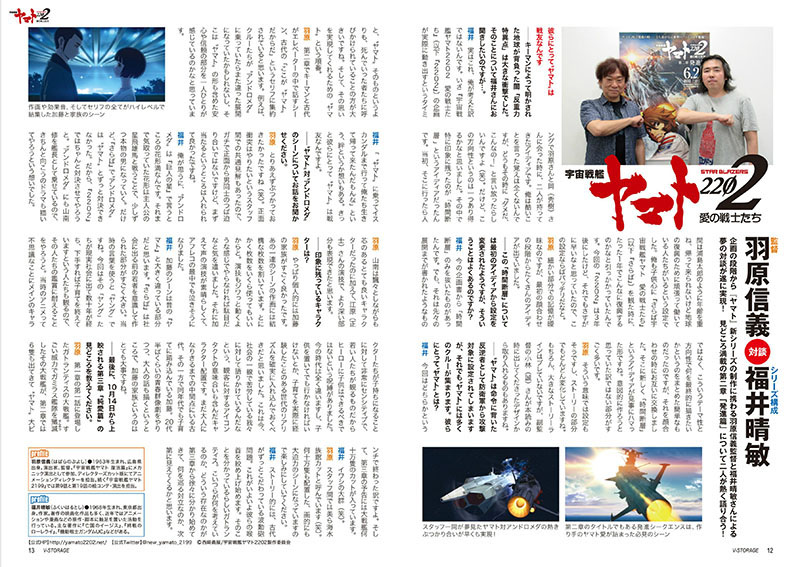
Farewell to Yamato, the highly-honored and greatest masterpiece of the series, is newly revived! A luxurious staff gathers together from the Yamato generation to take on the challenge of building a new story in Yamato 2202. Meanwhile, we hear about how the dream was finally realized in the planning and production stages from Director Nobuyoshi Habara and Writer Harutoshi Fukui! These two passionately discuss the highlights of Chapter 2, which was released on June 24 and became a big hit.
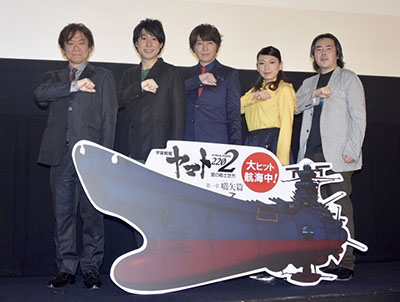
The idea of a “time fault” was especially impressive
Interviewer: What was it like to have direct contact with the fan reactions when you took the stage for the first day greeting for Chapter 1?
Habara: Yutaka Izubuchi was uneasy about how his different approach to Yamato 2199 would be accepted when he gave a stage greeting, but I was really relieved because the fans greeted me very warmly. (Laughs) Some people nodded while I was talking, which made me want to cry.
Fukui: I’m not a member of the direct-hit Yamato generation myself, I just had the feeling that I was going out to play with the older kids. I was uneasy, but like Mr. Habara I was relieved to get such a warm welcome from the fans.
Habara: I think everyone wanted this Yamato to happen, but I was really happy when I directly felt that they were pleased to see it.
Fukui: If we were to do Yamato with this timing now, it was based on the thought that we had to look at it objectively, and there was a sense of security that it was well-received. And I felt strongly that I wanted to see more new things than I expected.
Interviewer: In Chapter 2, the dark side of Earth exposed by Keyman, the “antigravity singularity,” was a big shock. I’d like to ask you about that, Mr. Fukui.
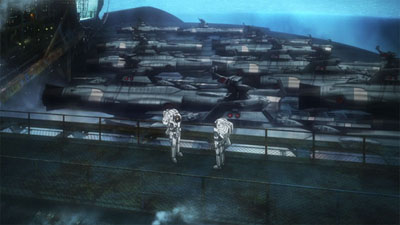
Fukui: Actually, I didn’t come up with it. When the plan for Yamato 2202 began to move forward, I met with Mr. Habara and Hideki Oka, and it was something they both thought of. I don’t remember saying anything bad about it, but I seem to have said, “this is no good.” However, I thought this could be one possible direction, and I was particularly impressed by the idea of a “time fault.” At first, we set it up where the humans who go into it would rapidly age, like with Urashima Tarou, and that they could never come back, but they were doing the job anyway for the sake of Earth’s revival.
When I saw Farewell, my young mind was struck with the idea of so much rebuilding in just one year. Even though 2202 was set three years later, I still thought it was too early, so this was a perfect concept. So, assuming this “time fault” was a reality, when I ran it through my mind it was a scary thing. I set the concept that humans couldn’t stay in it for long, but it would be possible with AI. Humans could realize this kind of thing through research and development, but in reality it would take ten or twenty years for it to take shape.
For example, if I put this “time fault” into my plan book for 2202 and used AI, all the scripts could be completed in six months. (Laughs) What would happen to humans in this case? I thought it was interesting, though it could never be a good thing. But if humans had it, they couldn’t resist using it. It cuts into the issue of “What is the proper value of humans and civilization?” Above all, I’m grateful to the image-making side because it was possible to show my idea of several hundred battleships.
Habara: My memory is a little vague, but there were a lot of ideas from that first meeting.
I think it’s “work” that humans have. It’s the same for both humans and Garmillas
Interviewer: It seems the “time fault” concept was slightly changed from the first idea. Is that a common thing?
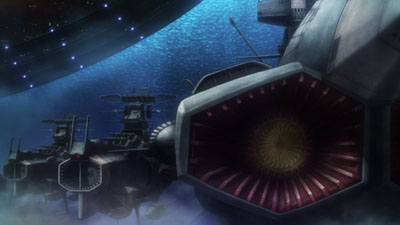
Fukui: The “time fault” was something that made it into the present plan book. But it wasn’t written as a development of the distant future. It was simply that I wanted to depict what sort of ending we’d arrive at by following the trend of this theme, and we all discussed it when we had a meeting about it. The “time fault” was a new idea that brilliantly fell into place. There are a lot of parts that I didn’t make intentionally at first.
Habara: In that way, parts of the story changed steadily. Of course, the overall storyline didn’t change, and there were things Mr. Kobayashi took in for his designs.
Fukui: When everyone looked at it, they went “huh?” But we need those “huh?” moments. When we go along with it, the ideas expand. I’d like the fans to share in the surprise of that “huh?”
Interviewer: They know it poses a threat to humanity, but they can’t help using it. Why is that?
Habara: I think it’s the “karma” of human beings. It’s the same for both Earth and Garmillas. If there’s such a convenient thing to be used, wouldn’t we use it? Thus, I think the difference between Keyman taking a long view of a threat in the future and Kodai learning about it for the first time is a point in Chapter 2.
Fukui: Keyman takes the long view and Kodai can never give up. Despite the story about whether or not to go to the eleventh planet in Chapter 2, this contrast will continue to come up in the future.
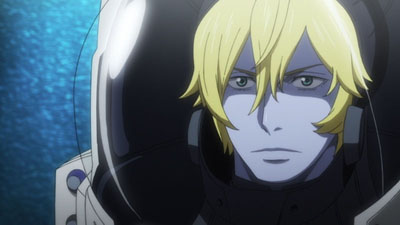
Interviewer: Keyman plays an important role in Chapter 2, but how do you perceive him? And how is Hiroshi Kamiya in the role of Keyman?
Habara: It’s as great as you expect, isn’t it? Keyman is a character we haven’t seen before, and I think that sets the tone for 2202. The first time I read Mr. Fukui’s script, I heard Kamiya doing the voice of Keyman, and it’s a perfect fit.
Fukui: His voice often comes into my head.
Habara: It’s perfect, including the sex appeal. It goes beyond the image.
Fukui: The result is that we meet the character for the first time when the voice actor speaks. Up until then, it’s thin and hazy.
Surely, Yamato is a fellow soldier to them
Interviewer: The Earth Defense Forces declare Yamato a target, a traitor that disobeyed orders. Still, many crew members gathered in Yamato. What do you think Yamato is to them?
Fukui: This time, rather than just being Yamato, it has a greater calling because of those who have died. And from there, it becomes the Yamato that will allow their dreams to be realized.
Habara: I think that’s summarized in a line we hear when Keyman and Kodai speak in the elevator in Chapter 2: “It’s because it is Yamato.” For example, if we were riding on Andromeda, it would be a different crew. I think there’s a sense of security and trust that everyone feels in the form of Yamato.
Fukui: “We got on board Yamato and went to Iscandar and came back alive.” That feeling gives them a bond. Surely, Yamato is a fellow soldier to them.
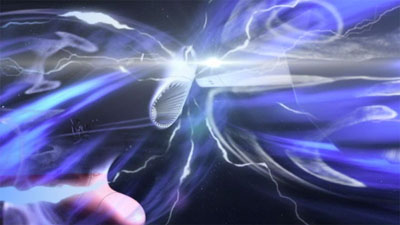
Interviewer: Yamato vs. Andromeda is a big highlight of Chapter 2. Please talk about that scene from the standpoint of a director and a writer.
Habara: I wanted them to clash from the start. (Laughs) The common view of the staff was that we wanted to do the head-on collision. We don’t literally have them start out spitting in each other’s faces, but I was glad we included that initial clash.
Fukui: I think Andromeda is Mitsuru Hanagana from Star of the Giants.
The star who arrogantly struts around gets into a fight against the main character and gradually becomes a real man. However, Andromeda wasn’t able to confront Yamato at any time in Farewell, so we set up a proper confrontation in 2202. Since Osamu Yamanami rides on Andromeda as its captain, there was a desire to properly depict the drama on the other side.
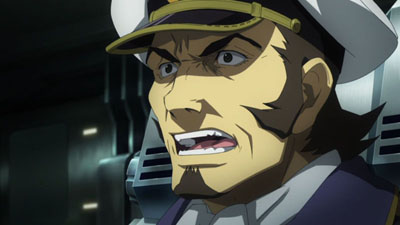
Habara: In addition to being a very good character at his core, Yamanami is quiet and brooding, which allowed Masashi Ehara to express the deeper parts of his acting.
Interviewer: Were there any other parts of Yamato vs. Andromeda that you were particular about?
Fukui: I had the idea that they should shoot at each other at first, to clash with each other as battleships before physically colliding. But it wouldn’t be good if they shot holes into each other, so that’s when I came up with the “asteroid ring” which was not used in 2199, and I thought Andromeda could shoot well at it. But I didn’t think up such a powerful thing as “Gravity Spread bullets.” (Laughs) I was surprised when they came up with that in the storyboard stage.
Habara: When we checked the CG and saw the big flash of light I thought, “Whoah, is Yamato all right?” (Laughs)
The voice acting was so good I almost cried in the middle of the voice recording
Interviewer: In addition to the action scenes, attractive characters appear in Chapter 2, including Kato who has a conflict between Yamato and his family. Which characters made an impression on you in Chapter 2?
Habara: For me, Kato’s family was very good. I devoted a lot of frames to those scenes. We can use as many frames as we want, and I wanted to take a lot of care with the performance. In addition to that, the voice acting was so good I almost cried in the middle of the voice recording.
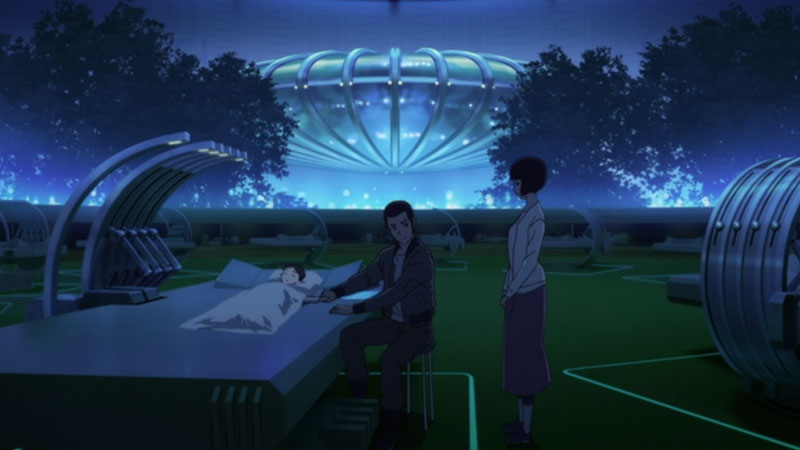
Fukui: I think that Kato scene is very different from the old Yamato. A big part of Farewell was to focus on young people before they go off into society. The term used in those days was “the young,” wasn’t it? It’s been a few decades since “the young” entered real society. Since people who have worked hard to raise children will also see this, I wanted to give them something to appreciate.
It’s a strange thing that anime in those days was very sensitive to main characters not being childish, and since young people watched it, there was a mantra that children shouldn’t be the heroes. It’s completely different in the present day, and we have to put children in the forefront. I thought we should definitely put in the realism of the generation that had actually experienced raising children.
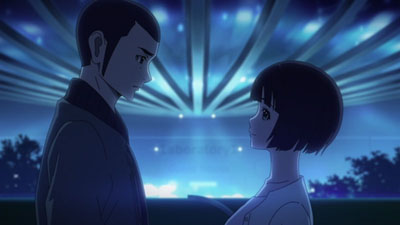
I’ve said that we’re speaking to those who are struggling with the restrictions of society, and the character arrangement gives an audience the someone to watch. Kodai is at the midpoint of becoming an adult, but on the other hand Kato has already stepped into raising a child at the same age. Kato’s family is very important in the place where we depict an adult situation in the midst of an ensemble story about people in their twenties.
Interviewer: Captain Okita symbolizes a bright past and Andromeda symbolizes a dark future. In the present, sandwiched between them, the big theme of the story is what the people in that moment feel and choose. How do you think about the relationship between these three axes?
Fukui: Just after Farewell was released, the 1980s were the runup period toward the bubble economy. Meanwhile, the entrance exam war became more and more severe. Young people were placed into a mold of “go to a good university and get a job at a good company that you can keep through old age.” It was an era that proceeded like a conveyor belt in the time fault.
Yamato set sail with that era’s questioning feeling of “Is this really how things should be?” but awaiting them ahead were people for whom size and numbers and power were everything. They tried to fight against them, but there was no chance of winning, so they were confronted with reality. They defeated the enemy at the cost of their own lives, and what remained was the purity of “We lived as human beings.” We’re translating that into a remake of an extreme work. (Laughs)

In that respect, the unpleasant reality of the current day is completely different from that of the 1980s. First of all, if you enter a good university and find a job in a company, you may have nothing to worry about. On the other hand, efficiency is demanded from everyone. If you don’t make something that emphasizes efficiency, you enter a world that has no appeal to real society. The structure for how to confront this is the same as in Farewell itself. If there is a person asking for help, it’s natural to lend a hand. Now, the feelings of Kodai are “I object to the way the world is being built.” So when we actually go there, it’s going to make things worse than before. (Laughs)
Habara: It’s really terrible. When I read a script, Mr. Fukui is a monster. (Laughs)
Your wife will probably recognize the NG word at a single glance. (Laughs)
Interviewer: Yuki Mori doesn’t appear much in Chapter 2. I’m worried about the future of her relationship with Kodai…
Habara: [Voice actor] Houko Kuwajima is the one most anxious about Yuki’s lack of appearances. (Laughs) She seems to think, “I haven’t been called, is the voice recording going OK? Do I get to ride on Yamato?” Chapter 3 is titled Pure Love Chapter and the key visual has been published.
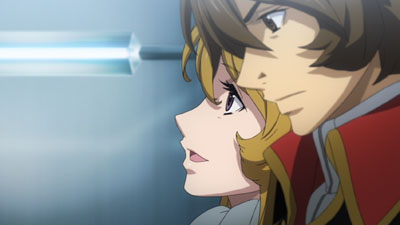
Fukui: In Chapter 2, we depict the scene of Yuki leaving Kodai in the elevator, because there are NG words that can’t be said between a couple. Over a long life of marriage you gradually understand which buttons you can push, but Kodai still doesn’t know. The direction of the facial expressions when Yuki says “You said that” is wonderful. I thought it was amazing, what could be expressed with anime.
Habara: The point of the scene is basically that they don’t see eye to eye. Kodai is facing downward, but Yuki is not. That part also expresses the gap between their feelings.
Fukui: To those who purchased the streaming version or the Blu-ray or DVD, I wont you to think about what the NG word is. (Laughs) Young people who want to learn, and the men of our generation who watch it with their wives. Your wife will probably recognize the NG word at a single glance. (Laughs)
Interviewer: You are both enthusiastic Yamato fans, please tell me about a scene that was particularly surprising in Chapter 2.
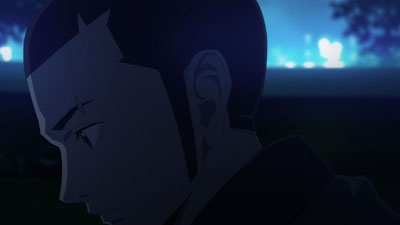
Habara: The scene with Kato’s family was unexpected. The daytime scene where the children are awake is filled with birds singing, and the night scene has crickets chirping. I calculated the screen design and the hue of Kato’s face when it’s backlit by the lights shining in the distance.
Fukui: In that Kato scene, the line from Makoto, “Go on. Go to Yamato” was not in the script at first. I wanted to reconfirm their marriage bond there, so when it reaches a peak she says, “Be a good father for Tsubasa and for me.” Afterward, it became unnecessary so I didn’t think we needed it. But it worked great for the trailer, so I learned very well that such lines are important.
Habara: Kato is definitely hesitant. I think Makoto understands that he won’t go if she doesn’t tell him to, so by daring to say “Go on. Go to Yamato” I felt it would make Kato able to go, so we put it in.
In this time, Pure Love Chapter should be used because it is Soldiers of Love, after all
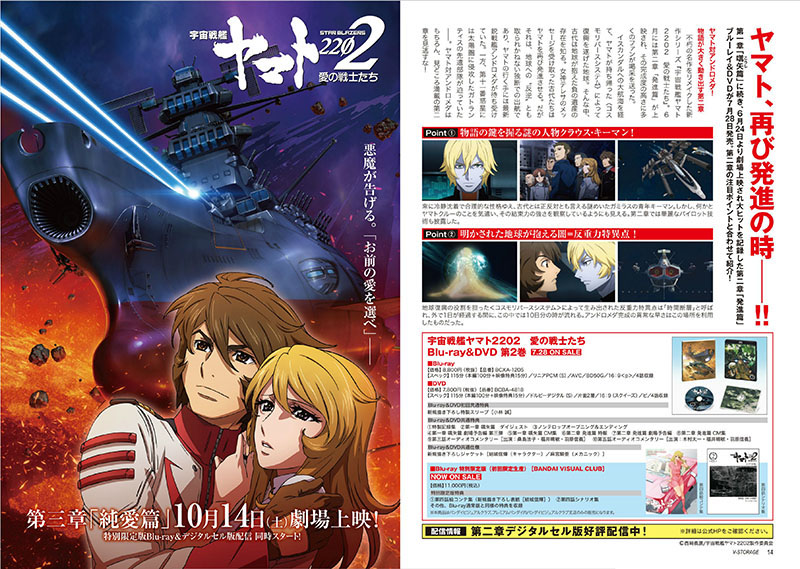
Interviewer: Please tell us the meaning of the title for Chapter 3, Pure Love Chapter.
Habara: Pure Love Chapter was what we called it in the preliminary stage (script meeting), and Mr. Fukui said, “I’ll call it Pure Love Chapter if I can’t think of anything else.” (Laughs)
Fukui: I was joking at first. At that point, even I thought it would be impossible. (Laughs) But at the stage when the storyboards for the 9th and 10th episodes came up, I thought Pure Love Chapter might be all right for this.
Habara: Rather, it should be called Pure Love Chapter in the present times. No matter how many other current words we came up with, our confidence in it was never shaken. It is Soldiers of Love, after all.
Interviewer: Please tell me about the highlights of Chapter 3.
Habara: There was the giant battleship of Gatlantis, which appeared in Episode 1 of Chapter 1. The giant battleship that annihilated the Garmillas fleet with great power. In Chapter 2, six of them appeared and we left Yamato in a pinch. The trailer for Chapter 3 contains shots of hundreds of thousands of giant battleships.
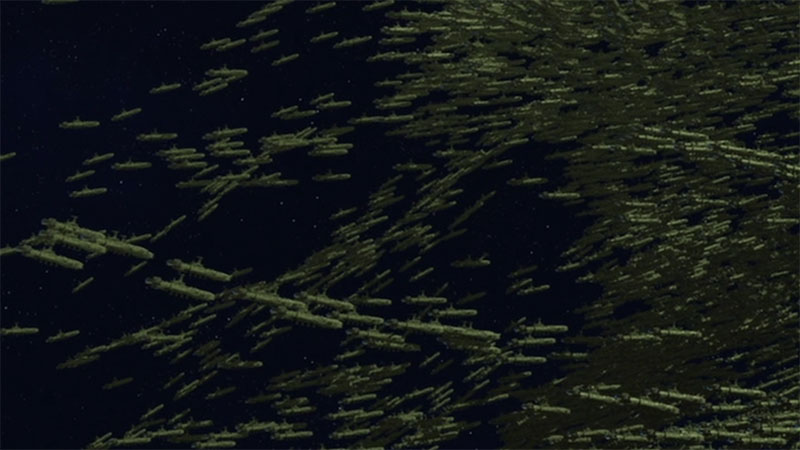
Fukui: A big school of sardines. (Laughs)
Habara: The staff calls it the “Churaumi Aquarium shot.” (Laughs) We placed hundreds of thousands of ships in it, and it’s a powerful image, so please look forward to it.
Fukui: In terms of story, we deal with the Wave-Motion Gun problem Kodai has been obsessed about. It finally begins to tighten around their throats. Gatlantis seems to know that. What are they thinking? You’ll begin to understand the point in Chapter 3, and I think you’ll gradually see what the conflict is over.
Interviewer: Finally, please give a message to the fans looking forward to video sales of Chapter 2 and the premiere of Chapter 3.
Habara: I think you’ll enjoy Chapter 2 in a theater, and there is also the musical side of Yamato. The BGM is wonderful, and I’m always thinking about ways it can be heard while I’m editing. As for those who get the Blu-ray and DVD, I’d like you to enjoy the sound effects and lines with headphones when you go through it a second time. By all means, I want you to have the good taste of stereo. And thank you for supporting Chapter 3.
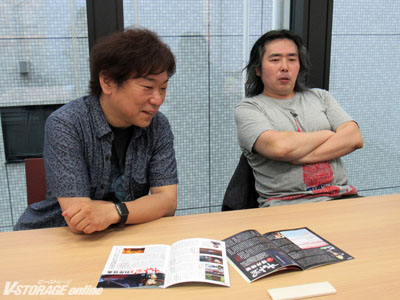
Fukui: I think it’s terrible that there was no other way to end Chapter 2. (Laughs) But as you get older, you know that three months passes quickly. There are new elements in Chapter 2, but we’re farther down the road with the original work, and the neighborhood begins to branch a little in Chapter 3. But as I’ve said before, the “good nostalgia” parts come out beautifully even when we diverge.
I’m different myself, but the main staff has a lot of noisy members from the middle of the Yamato generation. (Laughs) I’ve been making it while conversely absorbing what people are looking for, so I don’t think it will fall short of anyone’s expectations. I hope you’ll look forward to it.
Return to the index
